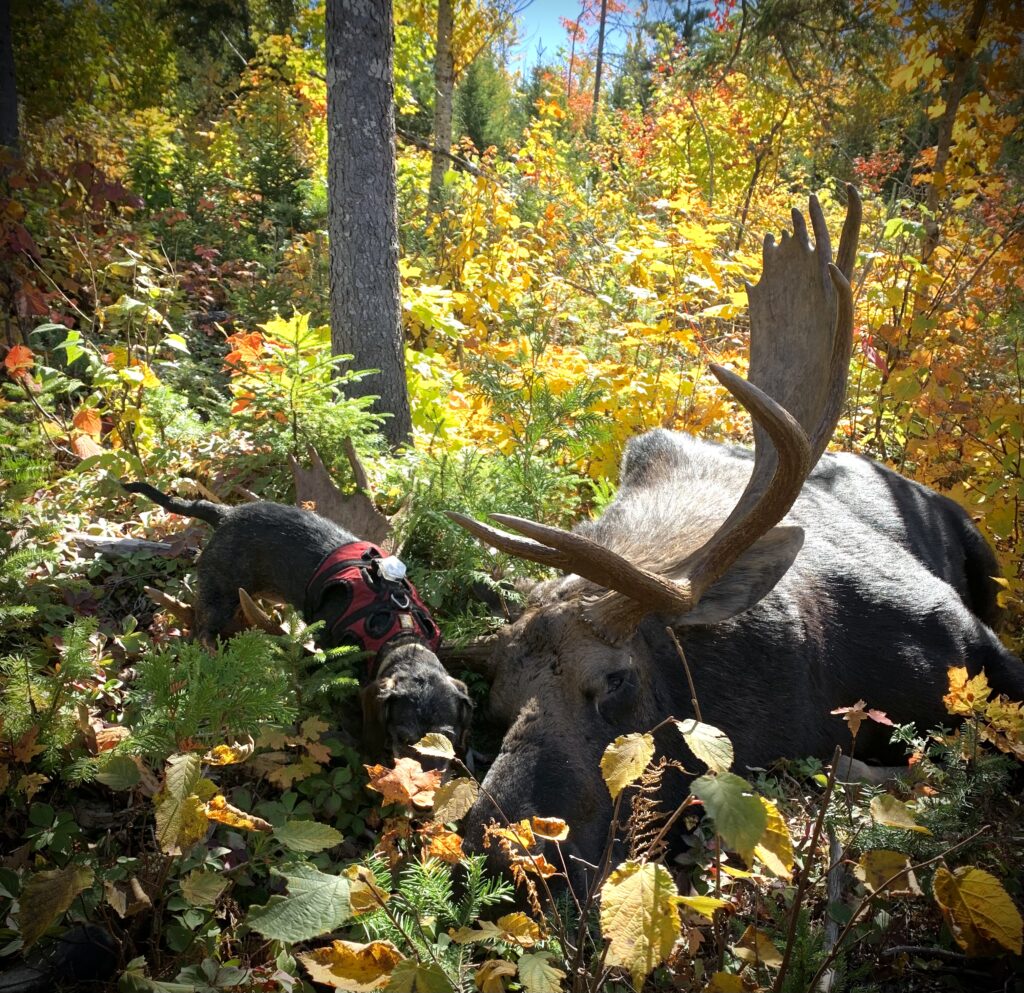
Lawsuit challenging Sunday hunting ban likely headed to Maine’s top court
By Pete Warner, Bangor Daily News Staff
A Readfield couple’s lawsuit challenging the state’s ban on Sunday hunting as part of Maine’s landmark right-to-food amendment appears to be headed to the Maine Supreme Judicial Court.
That comes after Superior Court Justice Deborah Cashman dismissed the suit, filed in April in Kennebec County Superior Court by Joel Parker and Virginia Parker against Judy Camuso, the commissioner of the Maine Department of Inland Fisheries and Wildlife, in a brief ruling dated Nov. 30.
The suit asserts that hunting should be included under the right-to-food amendment passed by Maine voters in November 2021.
The lawsuit targeting Maine’s ban on Sunday hunting is the first to argue that a new constitutional right to food trumps a major state law. The Parkers contend the ban is archaic and prevents them from harvesting food for their family.

Meggie the dog stands alongside the bull moose that she helped track after hunter Chris Sargent shot it in this year’s Maine moose hunt.
Democratic lobbyist Jared Bornstein, executive director of Maine Hunters United for Sunday Hunting, the group that spearheaded the most recent effort to overturn the state’s law prohibiting hunting on Sunday, said the ruling does not mean the suit is over, rather that the Parkers will be filing an appeal to the Maine Supreme Judicial Court.
“It does look bad, but it’s really not,” Bornstein said of the judge’s decision.
“They didn’t give any arguments at all. There’s no analysis,” he said of the ruling.
Bornstein said that because the Maine Superior Court system is so backlogged with cases resulting from the COVID-19 pandemic, and since the lower-court ruling likely would have been appealed by one of the parties, the motion to dismiss should help expedite the next step.
“There was no chance this wasn’t going to the [Maine] supreme court,” Bornstein said. “We think that they just didn’t want to waste time writing a decision, and they just dismissed it knowing it was going to get appealed.”
It is the practice of the Maine attorney general’s office not to comment on pending cases.
The amendment passed by voters guaranteed Mainers’ right to grow and harvest food for personal consumption. However, the language it contains is sometimes vague.
The Parkers said the law prevents them from hunting more than one day a week due to their work and family responsibilities and thus significantly affects their ability to provide food for themselves.
Legislative attempts to reverse or alter the longstanding Sunday hunting ban have been thwarted by landowner opposition and division among hunters on how energetically to pursue it. Challenges to the law have surfaced at least 35 times in the past 45 years, according to a state estimate.
In a motion to dismiss the case, Maine Attorney General Aaron Frey argued that the lawsuit lacked merit because the state’s ban on Sunday hunting falls in line with the state constitution.
The next step will be for the Parkers to formally appeal the court’s decision.
“I’m assuming that the Maine supreme court will accept our appeal and they’ll want to hear arguments from both sides and we’ll kind of go from there,” Bornstein said.